Scroll to:
ЦИФРОВИЗАЦИЯ ПРОЕКТНОГО МЕНЕДЖМЕНТА В ГОСУДАРСТВЕННОМ И МУНИЦИПАЛЬНОМ УПРАВЛЕНИИ РОССИИ
https://doi.org/10.17747/2618-947X-2020-2-206-215
Abstract
Проектный менеджмент в государственном управлении является наиболее эффективной формой взаимодействия органов власти с населением. Необходимо создать предпосылки для формирования процесса самосовершенствования системы управления в субъектах РФ, способствующего поддержанию позитивного имиджа региона и страны в целом. Цифровизация выступает отличным механизмом внедрения проектного менеджмента в управление регионом на базе трансформации системы государственного управления, ориентирами которого становятся минимальный государственный аппарат, высокая скорость принятия решений, отсутствие посредников между человеком и его данными, что позволяет индивидуализировать решения жизненных ситуаций граждан в системе «государство как платформа», которая постулируется в концепции Центра стратегических разработок начиная с 2017 года. Проектный менеджмент конкретизирует метафору «государство как платформа» в процессе цифровой трансформации оказания государственных услуг, контрольно-надзорной деятельности и принятия управленческих решений.
For citations:
Ostrovskaya N.V., Barykin S.E., Burova A.Yu. . Strategic decisions and risk management. 2020;11(2):206-215. https://doi.org/10.17747/2618-947X-2020-2-206-215
1. INTRODUCTION
The wide application of the project method in public administration makes it possible to achieve ambitious strategic goals on a national scale in Russia. At the federal level, projects address activities related to space, communications, electronics, and fuel and energy technologies. At the regional level, the project management method is used for international and interregional activities. Holding forums, exhibitions, and environmental events is important for the regions - this way new connections are established, funds, human resources, and much more are attracted.
However, despite the active implementation of project technologies, there are still quite a large number of errors in the implementation of state and municipal projects, such as failure to meet project deadlines, errors in the formation of
initial requirements, underestimation of the scope of work, numerous changes made during the project implementation, etc. By analyzing current projects and comparing them with past experience, we can give a more balanced assessment of current projects.
Thanks to the historical analysis of the formation of the Russian state at different levels of government, it is possible to assess the effectiveness of the project team, analyze the activities of stakeholders and form the main circle of errors from the point of view of management, and the result can give recommendations for improving the project method as a whole.
Currently, the public administration system is being transformed based on the image of the future state, in which the state apparatus is small, decisions are made quickly, there are no intermediaries in the form of state bodies between a person and their data, the possibility of building individual trajectories in development and solving life situations that a person faces – both in everyday life and in work is increasing. Such an idea of the state as a platform has been postulated in accordance with the concept of the Center for Strategic Research since 2017, when a public discussion was held on the transformation of public administration using the opportunities offered by new technologies. The metaphor "state as a platform" is important not only in the technological aspect, but also as a tool for changing the civil service during the digital transformation of public services, conducting licensing and supervisory activities, and making management decisions.
2. METHODOLOGICAL PROVISIONS
A project is a set of activities that are implemented in a limited period of time. The ultimate goal of the project is to get a unique result. According to the author of the work [Shchegolev, 2016], "project management is the management of activities that require constant regulation under the restrictive limitation on the timing, quality of work and costs." The distinctive features of any project are the focus on achieving goals and the uniqueness of its results in the presence of many limitations. Project management, in contrast to the functional approach, involves eliminating processes that are not necessary to achieve the final result, which guarantees resource savings, initiates effective interaction of all stakeholders and, thanks to a detailed plan, makes its results more predictable. All of the above allows to conduct high-quality monitoring of the project and provides a high probability of achieving the goals set. In state and municipal government, there is a contradiction between project management mechanisms and functionality, since, on the one hand, the transition to project management is proclaimed, and on the other, these projects are implemented using the old set of approaches and mechanisms, which reduces the likelihood of their success.
The importance of project management is determined by three main parameters of project management (Fig. 1).

Project management is in demand in public administration in modern Russia: if it is necessary to achieve strategic ambitious goals in conditions of limited resources, project conception allows to concentrate their use in strategically important areas.
Project management forms a motivation system aimed at achieving the final result. This is especially important in relation to state and municipal management, where many managers and specialists are characterized by the mindset of an employee who is responsible more for current processes than for the final result, since the specifics of project management in government bodies is different (figure 2). An important goal of implementing project management in state and municipal management can be the increase in the effectiveness of interdepartmental and inter-level interaction. It is necessary to change the approach to personnel management and the creation of project teams in executive bodies, which will include representatives of various ministries and departments, representatives of business and non-profit organizations. Interested parties who always closely follow the direction of state policy will be able to take into account emerging trends when drawing up their business plans and involve international companies in their implementation.
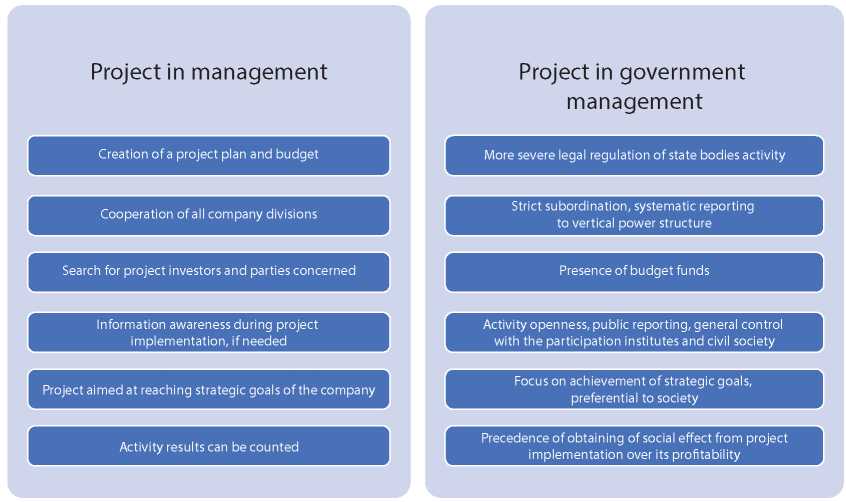
Meeting and reducing deadlines for getting results is another advantage of project management, which implies the presence of control points where project implementation is monitored, and necessary adjustments are made when the deadlines for interim results are not met. Finally, in the approach we are considering, the costs required to achieve the result are clearly calculated, the level of reasonableness of resource allocation is high, and there is a clear understanding of when, in what amounts, and for what purposes funding is provided. When implementing project management by the executive branch, changes will occur in a number of areas (Fig. 3).
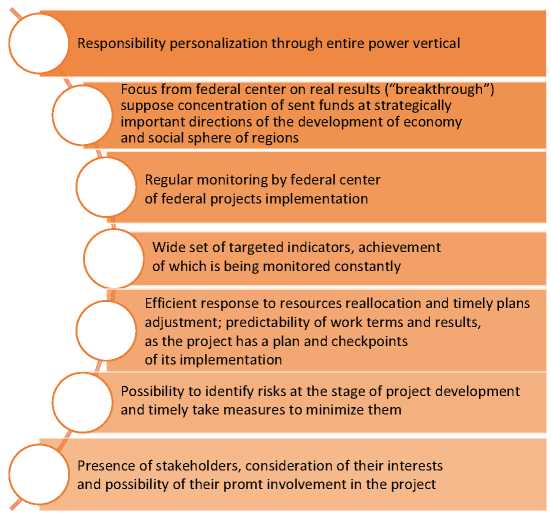
In Russia, project management is still not used as widely as in some foreign countries. According to the Japan Project Management Association, all investment and construction projects implemented within the framework of territorial development programs are evaluated and implemented in the country using project management technologies, while in Russia this indicator does not exceed 1.5–2% [Vasiliev, Prokofiev, 2016]. At the same time, investing in regional development projects contributes to improving the socioeconomic efficiency of Russian society [Ignatova, 2016].
There is no doubt that project management will be increasingly used in Russia in both state and municipal administration. However, trying to stay in the trend, local leaders sometimes emasculate its content. For example, projects are initiated and implemented in many cases spontaneously, without coordination with the services and without taking into account human resources, financial, material and technical support, etc.), without fully taking into account the strategies for the functioning and development of territories. Currently, two fundamentally different types of activity can be found in state and local self-government bodies: process and project conception. Process activity is characterized by its cyclical nature. In other words, we can call a process a regularly repeated sequence of actions in which resources are spent and some result is achieved. Governing bodies are usually simply created to implement certain processes. For growth, innovation, and qualitative changes in the key development indicators of a federal subject or municipality, a different type of transformation is required, which is carried out within the framework of the project.
Staff development is the basis for the activities of state and local government bodies. Human resources management is one of the most important tasks when using project management. The work of project team members creates opportunities for the development of both an individual employee and a structural unit, as well as the entire organization. To successfully implement a project throughout its life cycle, various specialists (including representatives of business, nonprofit organizations, experts from public organizations, etc.) with different skill levels are involved in it, the composition and number of participants change during the project implementation, but all members of the project team must have basic competencies in the field of project activities. All this requires the creation of a unified information system and access to it for project participants. Experience in design solutions and their implementation should be accumulated, which will become the basis for promoting new design ideas. In our opinion, the implementation of national projects will give a new impetus to the development of the information space (including information and communication technologies) and the implementation of a set of measures to support and promote socially significant projects for the population. Information and advisory support for project groups on current legal acts should be fully provided.
The problems encountered in the authorities when using project management are shown in Fig. 4
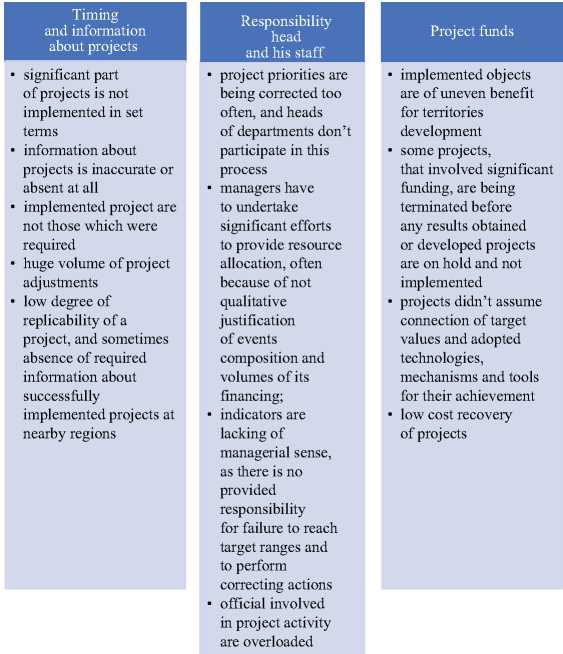
We can conclude that the importance of decision-making remains in the first place, all the difficulties with the implementation of the project are related to funding and workload or duplication of official duties of employees. It is necessary to use digitalization and introduce new technologies for the implementation of activities in the management bodies.
All of the above is the result of "deleting" the content of project management in the field, low competence and insufficient motivation of responsible officials and members of project teams. These problems also indicate that project offices of ministries and departments do not function effectively enough in most regions, and they are not even established everywhere at the local level, while project offices should solve these problems (Fig. 5).
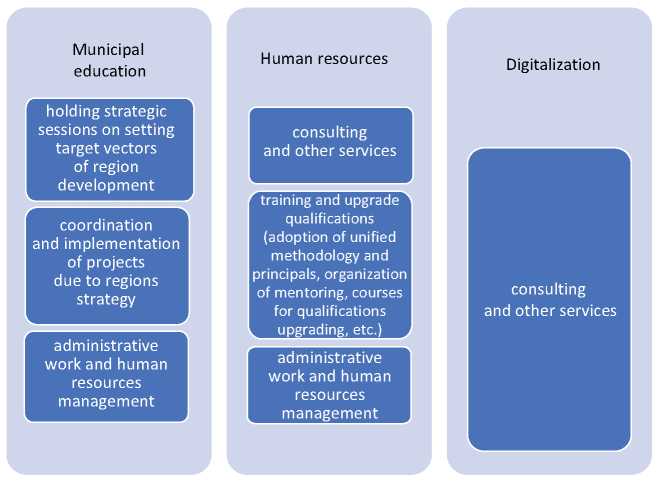
To effectively manage project portfolios, it's required to make changes in two main areas. Consulting and other services include project evaluation and acceleration, audits, risk management, web portal management and information system management, project reporting, data collection and distribution of reports, operational planning and forecasting, contract and change management, career development and personnel promotion, etc. Administration involves maintaining archives: experience generalizing, creating a library of project documents and knowledge bases managing, information storing, ensuring the completeness and security of data, and so on.
A number of examples can be given that characterize the general trends in the implementation of regional digital initiatives in the main areas of development and implementation of regional digitalization projects [Vilken, 2019].
1. Implementation of regional projects in the fi eld of digital transport and new technologies in the housing and communal system in Tyumen and Novgorod regions, as well as in the Republic of North Ossetia. This includes informing passengers about bus schedules, adaptive traffi c lights in the framework of the "Smart City" project in Tyumen region, and projects of an intelligent platform for accounting resources in the housing and communal services sector in North Ossetia. Novgorod region uses new technologies for processing digital tracing based on mobile phone data to count the number of tourists.
2. Regional electronic budget, scientifi c and technical IT center, for example, involvement of leading IT developers and programmers in Ryazan in solving regional problems. In the Altai territory, information technologies are used to monitor the state of arable land from satellites. Kaluga region is implementing a project to create a national data management system that provides information to all participants in digitalization.
3. Educational programs, such as the annual training of six thousand IT specialists in the economy of Samara region, training of specialists in two new master's programs at the Don State Technical University in the fi eld of intelligent systems based on blockchain technologies and in the field of digital accounting and management. Far Eastern Federal University trains specialists in law in the fi eld of information security who implement and use the latest technologies and calculate legal risks when creating startups. Master's programs at Ural Federal University are aimed at developing narrower and deeper competencies, including big data analysis, digital modeling of physical systems, design of geoinformation systems, artifi cial intelligence, and other relevant specializations.
The implementation period of the "Digital Economy" national program is set from October 1, 2018 to December 31, 2024. The program includes six federal projects (Fig. 6).
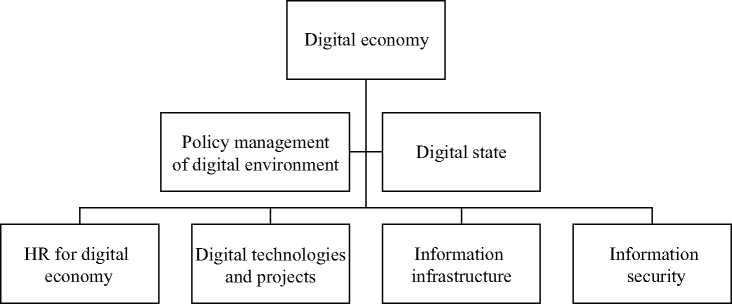
Implementation of project management at the present stage is a key direction in the development of state and municipal management. Focus on results under tight resource and time constraints, clear goals and objectives, and risk and constraint management are the main components of project management effectiveness. New challenges require the development of such competencies of civil servants as flexibility of thinking and readiness for change, the ability to interact within the framework of teamwork, personal effectiveness and decision-making in conditions of risk and uncertainty.
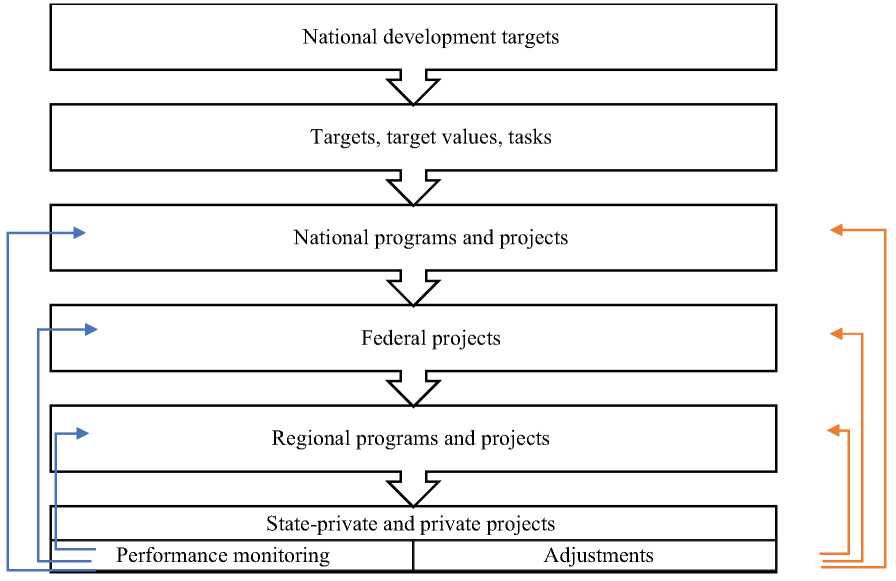
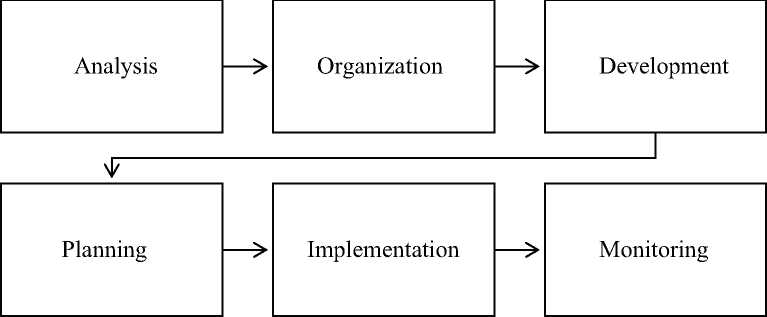
3. RESULTS
Let's consider the presented stages of the digital transformation process of the regional economy. At the same time, as part of the digitalization program, the region forms its own list of priorities for implementing digital transformation, taking into account the region's socioeconomic development priorities and regional competitive advantages.
The analysis stage includes SWOT analysis of the regional economy and analysis of strategic documents on socio-economic development available at the regional level. Thus, at this stage, the priority areas of digitalization for this region are determined.
At the organizational stage, a partnership between stakeholders is being formed, and a management structure for the regional digitalization process is being developed. Further, the development and formalization of the strategic vision of the results of the digital transformation of the region is carried out.
The planning stage includes the development of a set of strategic plans for digital transformation: at the levels of the region, individual industries, and municipalities. After that, programs and "road maps" are formed for the implementation of the developed strategic plans in the regional and municipal economy.
At the implementation stage, the developed programs are directly implemented in accordance with the"road maps". The monitoring stage is devoted to comparing the planned results of the regional economy digitalization with the actual ones and evaluating the effectiveness of implemented strategic plans.
We can note the following advantages of the approach to developing regional projects and digitalization programs based on the DECA methodology. First, the region's digitalization management is based on a multi-stage analysis and assessment of the situation in the region. Second, this approach ensures the structuring of the regional digitalization process. Third, within the framework of this approach, a conceptual scheme for the implementation of the region's digitalization process is being formed. At the same time, a significant drawback of this approach can be noted: when applying it, attention is more focused on assessing the situation in the region than on managing the development of the region in the context of digitalization.
Thus, the analysis of regional digitalization programs presented in the public domain has shown that the problem of methodological support for the process of developing regional digitalization programs is still relevant. It is necessary to ensure the transition of regional digitalization projects from an expert-heuristic approach to a quantitative justification of the processes of selecting targets, tools, resources and measures for implementing the regions digital transformation. At the same time, to quantify various aspects of regional digitalization projects, it is advisable to use criteria for the achieved socio-economic efficiency of projects and the level of risk.
4. CONCLUSION
Within the framework of the proposed approach to the formation of regional digitalization projects, when developing a regional digitalization project, it is necessary to solve a number of scientific and practical tasks.
First, it is necessary to assess the level of use of modern digital technologies in the region in such areas as public administration, social sphere and economy.
Secondly, we need to create a methodological framework that will allow us to effectively plan the goals of the region digitalization and objectively evaluate the results of digitalization activities.
Third, create a list of possible options for the region digitalization and compare them based on quantitative analysis, and then choose the best one.
Fourth, it is necessary to develop the best possible organizational and financial mechanism for implementing a regional project for the chosen digitalization option and to form the project's resource support.
Fifth, create a register of the regional digitalization project risks, conduct their qualitative and quantitative analysis, and develop a set of measures to manage the identified risks.
Finally, it is important to forecast the results of a regional digitalization project in the short, medium and long term.
Thus, in the context of the digitalization of the regional economy, the relevance of the problem of methodological support for the development of regional digitalization projects should be noted. Russian regions, in conditions of insufficient methodological and systematical support, develop their own digitalization projects, focusing mainly on their own experience and competencies. However, digital transformation, as a process characterized by system-wide consequences for all regions of the country, requires the use of the most effective approaches to the formation of regional projects. Currently in the regional programs of digitalization an expert-heuristic approach is used primarily. It is necessary to use quantitative methods of estimating costs, possible effects, choosing priorities and strategies for digitalization in the process of forming regional digitalization programs. The proposed approach to the development of regional digitalization projects is intended to analyze the digital development of the region and use quantitative estimates to choose the optimal digital transformation strategy for it.
To implement the principles of objectivity, flexibility, speed and service, the public administration system must function as an advanced IT corporation. Project management in state and municipal management reduces organizational resistance to the introduction of digital technologies. Employees will be able to expand their competencies and skills and use them in the digital economy. Digitalization of project management in the state and municipal administration of Russia provides many opportunities, but for their further implementation in practice, it is necessary to:
- conduct an analytical review of the current activities of the management bodies of a particular subject of the Russian Federation;
- give an analytical assessment of the digitalization current state of economic activity of the subject of the Russian Federation;
- develop methodological and practical recommendations for improving the mechanisms for implementing the new technological structure of industry 4.0 in regional management through project management.
To develop the human resources potential of state and municipal authorities and improve the labor potential of the region, it is necessary to:
- analyze the current state of human resources and opportunities to work in project groups;
- develop methodological and practical recommendations for the implementation of modern project methods in state and municipal management.
References
1. Budaeva I.O. (2017). Primenenie proektnogo menedzhmenta kak naibolee effektivnogo instrumenta upravleniya intellektual’nym potentsialom v regione [Application of project management as the most effective instrument of intellectual potential management in the region]. Vestnik Zabaykal’skogo gosudarstvennogo universiteta [Transbaikal State University Journal], 23(9), 134‑143.
2. Vilken V.V. (2019). Upravlenie regional’nym razvitiem v usloviyakh tsifrovoy ekonomiki [Managing regional development in the digital economy]. Diss. … kand. ekon. nauk [Dis. cand. econ. sci.]. St. Petersburg, SPbPU. URL: http://www.iresras.ru / uploads / 2019 / диссертации / Vilken / Диссертация%20Вилькен%20 вв..pdf.
3. Vasilyev A.I., Prokofyev S.Ye. (2016). Organizatsiya proektnogo upravleniya v organakh gosudarstvennoy vlasti [Project management organisation in public authorities]. Upravlencheskie nauki [Management Sciences in Russia], 6(4), 44‑52.
4. Dyubanov A.V. (2018). O razvitii tsifrovoy ekonomiki v Novosibirskoy oblasti. Materialy Ministerstva ekonomicheskogo razvitiya Novosibirskoy oblasti [On the development of the digital economy in the Novosibirsk region. Information of the Ministry of Economic Development of the Novosibirsk Region]. URL: http://econom.nso.ru / sites / econom.nso.ru / wodby_files / files / news / 2018 / 04 / 1_dyubanov.pdf.
5. Ershova T.V., Khokhlov Yu.E., Shaposhnik S.B. (2018). Kak otsenit’ gotovnost’ strany k tsifrovoy ekonomike: instrument «Digital economy country assessment» [How to assess the country’s readiness for a digital economy: The tool “Digital economy country assessment”. In: Sbornik statey prepodavateley IX Mezhdunarodnoy nauchno-prakticheskoy konferentsii «Sovremennaya ekonomika: kontseptsii i modeli innovatsionnogo razvitiya» [Digest of teachers articles of the IX International science and practical conference “Modern economy: Concepts and models of innovative development”]. Moscow, 11‑25.
6. Zabolotskikh A., Sinyaeva O. (2015). Napravleniya primeneniya proektnogo menedzhmenta v gosudarstvennoy sfere na segodnyashniy den’ v Rossiyskoy Federatsii [Areas of Application of Project Management in the Public Sphere in Today’s Russia]. Liderstvo i menedzhment [Leadership and Management], 2(3), 209‑222.
7. Ignatova A.M. (2016) Primenenie proektnogo metoda v gosudarstvennom upravlenii sovremennoy Rossii [Application of the project method in public management on modern Russia]. Marketing MBA. Marketing Management Firms, 7(1), 176‑189.
8. Indeks «Tsifrovaya Rossiya» [Index “Digital Russia”]. URL: https://finance.skolkovo.ru / downloads / documents / FinChair / Research_Reports / SKOLKOVO_Digital_Russia_Report_Full_2019-04_ru.pdf.
9. Kuznetsova E.G., Gorin I.A. (2017). Praktika primeneniya proektnogo podkhoda k realizatsii gosudarstvennykh programm razvitiya regiona [The practice project approach to the implementation of state programs for regional development]. Fundamental’nye i prikladnye issledovaniya kooperativnogo sektora ekonomiki [Fundamental and Applied Researches of the Cooperative Sector of the Economy], 2, 31‑37.
10. Nikolaev S. (2018). Tsifrovaya ekonomika kak zaslonka kvantovogo skachka v «zolotoy vek» [Digital economy as a shutter of a quantum jump in the “Golden age”. Business & IT, 1 (74). URL: http://bit.samag.ru / archive / article / 1960.
11. Pavkina Yu.V. (2017). Primenenie proektnogo menedzhmenta v gosudarstvennom sektore Rossiyskoy Federatsii [Application of project management in the public sector of the Russian Federation]. Nauchnyy al’manakh [Science Almanac], 4‑1(30), 209‑211.
12. Smirnov M.A. (2016). Povyshenie effektivnosti realizatsii gosudarstvennykh programm za schet proektnogo podkhoda [Increasing the efficiency of government programs implementation through the project-based approach]. Finansy i kredit [Finance and Credit], 35(707), 37‑48.
13. Usik N.I. (2016). Issledovanie zadach upravleniya natsional’nym khozyaystvom v Rossii [Study of the management tasks for national economy in Russia]. Nauchnyy zhurnal NIU ITMO, Seriya «Ekonomika i ekologicheskiy menedzhment» [Scientific Journal NRU ITMO, Ser. “Economics and Environmental Management”], 3, 79‑84.
14. Shamina L.K., Yakovlеva N.V. (2015). Rol’ organov gosudarstvennogo upravleniya Severo-Zapadnogo federal’nogo okruga v sisteme upravleniya razvitiem potentsiala regiona [The role of the public administration bodies of the North-Western federal district in the management system of capacity development of the region]. In: Bondarenko V.V., Tanina M.A, Yurasov I.A., Yudina V.A. (eds.). Upravlenie razvitiem territoriy na osnove razvitiya preobrazhayushcikh investitsiy. Sb. nauch. st. Mezhdunar. nauch.‑prakt. konf. [Territorial development management through the development of transformative investments. Digest of sci. art. of the International sci. and pract. conf.]. Penza, Izd-vo PGU.
15. Schwab K. (2016). The though indusrial revolution. Мoscow, Eksmo.
16. Shchegolev A.V. (2016). Povyshenie effektivnosti gosudarstvennoy ekonomicheskoy politiki na osnove vnedreniya proektnogo upravleniya [Improving the efficiency of public policy based on the implementation of project management]. Srednerusskiy vestnik obshchestvennykh nauk [Central Russia Journal of Social Sciences]. Т. 11. № 6. С. 440‑445
17. Adams S. (2016). Clayton Christensen on what he got wrong about disruptive innovation. URL: https://www.forbes.com / sites / forbestreptalks / 2016 / 10 / 03 / clayton-christensen-on-what-he-got-wrong-about-disruptive-innovation / #35cd8e81391b.
18. Nikiforova V.D., Achba L.V., Nikiforov A.A., Kovalenko A.V. (2020). Dialectics of the processes of digitization of the socio-economic system. Lecture Notes in Networks and Systems. 1120‑1143.
19. Putihin Y.E., Volkova E.S. 2017. Selection of strategic solutions based on cost approach. Рroceedings of 2017 ХХ IEEE International conference on soft computing and measurements (SCM), 774‑776.
20. Sapozhnikova N.G., Putihin Y.E., Akimova Y.N., Melnikova L.A., Antonova O.V. (2019). Technology for implementing corporate social responsibility. International Journal of Innovative Technology and Exploring Engineering, 9(1), 1544‑1548.
About the Authors
N. V. OstrovskayaRussian Federation
Сandidate of political sciences, associate professor of management, St. Petersburg Branch of Financial University under the Government of the Russian Federation. Research interests: regional economy, the project management, the public governance.
S. E. Barykin
Russian Federation
Doctor of economic sciences, professor, Graduate School of Service and Trade, Peter the Great St. Petersburg Polytechnic University. Research interests: smart supply chains, the theory and economics of the digital economy, digital logistics, digital ecosystems and platforms.
A. Yu. Burova
Russian Federation
Candidate of historical sciences, dean of the faculty of finance and economics, St. Petersburg Branch of the Financial University under the Government of the Russian Federation. Research interests: regional economy, the historical issues of economics, the public governance.
Review
For citations:
Ostrovskaya N.V., Barykin S.E., Burova A.Yu. . Strategic decisions and risk management. 2020;11(2):206-215. https://doi.org/10.17747/2618-947X-2020-2-206-215









































